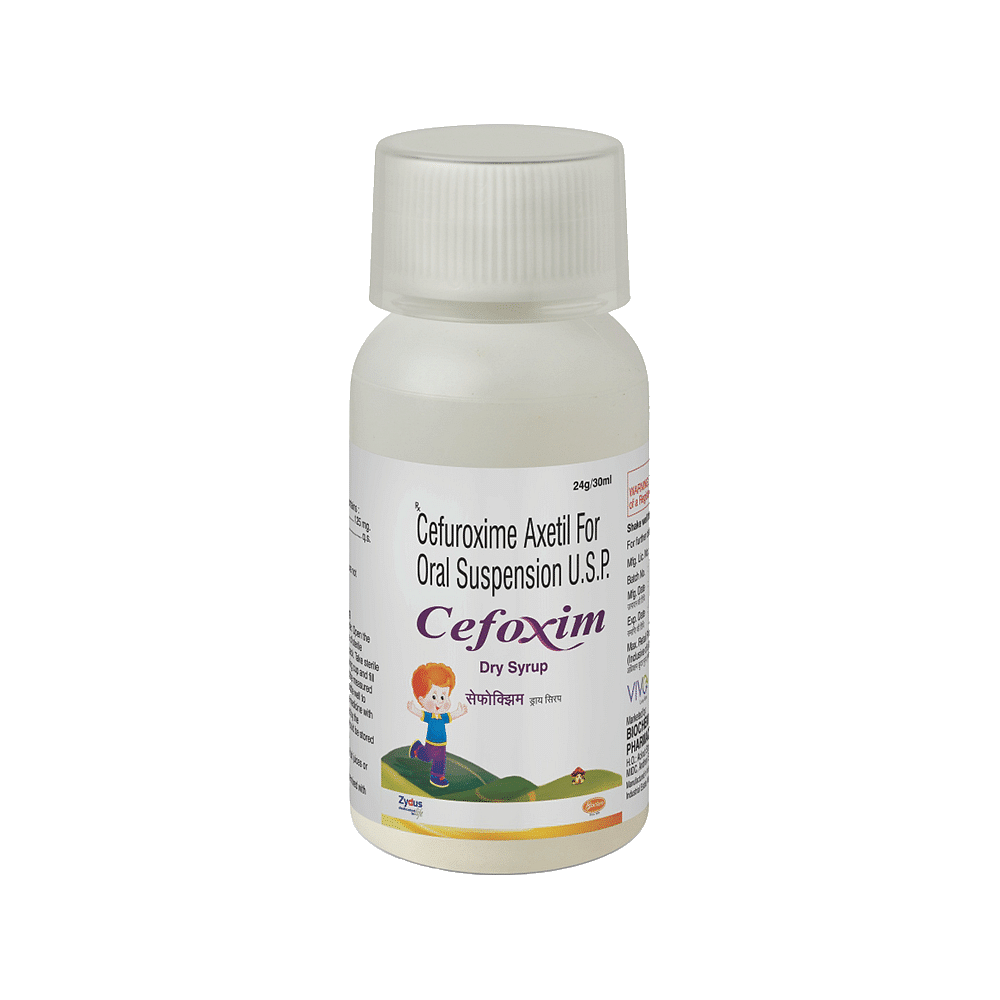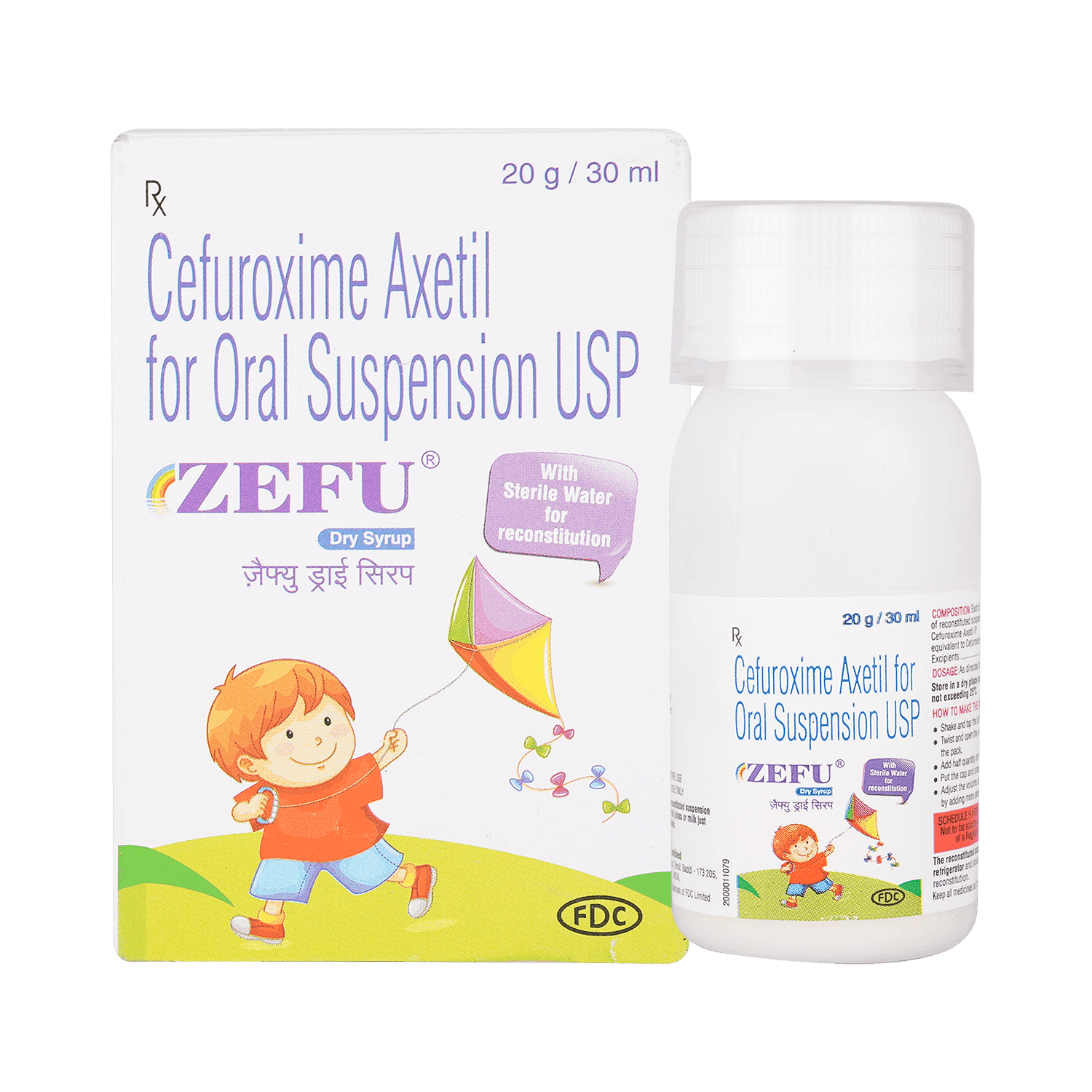
Croxim Syrup
Manufacturer
Indo-Safe Pharmaceuticals
Salt Composition
Cefuroxime (125mg)
Key Information
Short Description
Croxim Syrup effectively treats bacterial infections in children, including infections of the ear, nose, throat, lungs, skin, soft tissues, bones, joints, and urinary tract.
Dosage Form
Syrup
Introduction
Croxim Syrup is an antibiotic used to treat various bacterial infections in children. It is effective against infections of the ear, nose, throat, lungs, skin, soft tissues, bones, joints, and urinary tract. Additionally, it is used to prevent infections in animal and human bite wounds and may be administered before surgical procedures as a preventive measure. While generally safe, it is important to complete the full course of treatment to prevent bacterial resistance. Consult a doctor if any severe side effects occur.
Directions for Use
Administer Croxim Syrup to your child as prescribed by the doctor. Ensure the full course is completed even if symptoms improve.
How it works
Croxim Syrup is an antibiotic that works by preventing the formation of the bacterial cell wall, which is essential for bacterial survival. This action stops the bacteria from growing and spreading, effectively treating the infection.
Quick Tips
Encourage your child to drink plenty of water in case diarrhea develops as a side effect. Your child must complete the entire course of antibiotics. Stopping too soon may cause the bacteria to multiply again, become resistant, or cause another infection. Conditions like common cold and flu are caused by viruses. This medicine is not to be taken in such cases. Only give Croxim Syrup to your child for their current infection. Never save medicine for future illnesses. Discontinue giving Croxim Syrup and consult the doctor immediately if your child develops an itchy rash, facial swelling, or breathing difficulties while taking this medicine.
Related Medicines

Cefurocod 125mg Syrup

Acctum 125mg Syrup

Bid 125mg Syrup

Cerex 125mg Syrup

Cartum 125mg Syrup

Cefoxim 125mg Syrup

Zefu 125mg Syrup

Ceftirox 125mg Syrup

Cefimun 125mg Syrup

Cefutab O 125mg Syrup
Frequently asked questions
Can I give Croxim Syrup to my child if they have a seizure disorder?
Croxim Syrup should be used with caution in children with a history of seizure disorder. If seizures occur, discontinue Croxim Syrup and consult your child's doctor immediately.
What if I accidentally give too much of Croxim Syrup to my child?
An extra dose of Croxim Syrup is unlikely to cause harm. However, if you think you have given too much of Croxim Syrup to your child, speak to a doctor immediately.
Are there any serious side effects of Croxim Syrup?
Some serious side effects of Croxim Syrup include persistent vomiting, kidney damage, allergy, diarrhea, and severe gastrointestinal infections. Always consult your child's doctor if you experience any of these symptoms.
Can I give other medicines to my child while they are taking Croxim Syrup?
Croxim Syrup can interact with other medicines or substances. Inform your doctor about any other medicines your child is taking before starting Croxim Syrup, and check with your child's doctor before giving any medicine to your child.
Can my child get vaccinated while taking Croxim Syrup?
Antibiotics usually do not interfere with vaccine ingredients or cause a bad reaction in a child who has just been vaccinated. However, children taking antibiotics should not get vaccinated until they recover from the illness. As soon as your child feels better, the vaccine can be given.
What lab tests may my child undergo while taking Croxim Syrup on a long-term basis?
The doctor may prescribe periodic kidney function tests and liver function tests to monitor your child's condition.
Does a common cold caused by viruses always result in a secondary bacterial infection? When to start an antibiotic to prevent infection?
In most cases, bacterial infections do not follow viral infections. Using antibiotics to treat viral infections may lead to side effects without benefiting your child's health. Consult your child's doctor before giving antibiotics.
Can Croxim Syrup affect my child's digestion?
Antibiotics can affect the good bacteria in the gastrointestinal tract, leading to diarrhea or other infections. If your child experiences diarrhea while taking Croxim Syrup, consult your child's doctor for guidance.
How long does Croxim Syrup take to work?
The time it takes for Croxim Syrup to work depends on the type of infection and the patient's response to the medicine. Symptoms of bacterial infections may start to decrease within 48 to 72 hours after starting the medication.
How long should my child take Croxim Syrup?
The duration of therapy with Croxim Syrup depends on the type of infection. It is usually given for 7 days, ranging from 5 to 10 days, depending on the response of the infection. Consult your child's doctor for the exact duration of therapy.
Can Croxim Syrup be taken on an empty stomach?
No, Croxim Syrup should not be taken on an empty stomach. It should be taken twice daily after a meal, as taking it with food increases the absorption rate of the drug.
Can Croxim Syrup treat UTI?
Yes, Croxim Syrup can be used to treat uncomplicated urinary tract infections (UTIs) for 7 to 10 days. However, self-medication is not advised, and the medication should be prescribed by a doctor.


